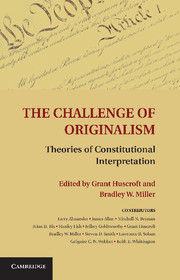Book contents
- Frontmatter
- Contents
- Preface
- Contributors
- The Challenge of Originalism: Theories of Constitutional Interpretation
- Part One Exposition and Defense
- 1 What Is Originalism? The Evolution of Contemporary Originalist Theory
- 2 The Case for Originalism
- 3 On Pluralism within Originalism
- Part Two Interpretation and Intention
- Part Three Originalism and Constitutional Settlement
- Part Four Challenges and Critiques
- Index
- References
2 - The Case for Originalism
from Part One - Exposition and Defense
Published online by Cambridge University Press: 07 October 2011
- Frontmatter
- Contents
- Preface
- Contributors
- The Challenge of Originalism: Theories of Constitutional Interpretation
- Part One Exposition and Defense
- 1 What Is Originalism? The Evolution of Contemporary Originalist Theory
- 2 The Case for Originalism
- 3 On Pluralism within Originalism
- Part Two Interpretation and Intention
- Part Three Originalism and Constitutional Settlement
- Part Four Challenges and Critiques
- Index
- References
Summary
The Best Argument for Originalism
The best argument for originalism is simple, straightforward, and powerful:
A constitution, like any other law, necessarily has a meaning that pre-exists judicial interpretation of it.
The meaning of a law is part (perhaps all) of what it is; therefore, to change the meaning of a law is to change the law.
The original meaning of a constitution is neither its original literal meaning (called “sentence meaning” by philosophers) nor its originally intended meaning (“speaker's meaning”); it is, instead, its “utterance meaning,” which is determined by a restricted range of evidence, extra-textual as well as textual, of what its founders intended it to mean.
When a constitution itself requires that it be changed only by some special democratic procedure, this binds judges as well as other officials. The judges must not change the constitution – or, by inference from Proposition 2, its meaning – by purporting to “interpret” it.
Any judge who violated that requirement would flout the constitution itself, the rule of law, the principle of democracy, and (in many federal systems) the principle of federalism.
When interpreting such a constitution, the judges’ primary duty is to reveal and clarify its pre-existing meaning. When that meaning is insufficiently determinate to resolve the case at hand, their secondary duty is to act creatively and supplement it. To supplement the meaning of the constitution is not to change it.
Two additional propositions respond to popular but misguided non-originalist criticisms:
Although judges must not deliberately change the constitution, there are at least four ways in which constitutional law can and does legitimately evolve over time. To that considerable extent, originalism is perfectly consistent with “common law constitutionalism” and “living constitutionalism.”
Consistent application of any constitutional theory, including originalism, might lead to grave injustice in a particular case. Judges might then be morally bound to disobey the constitution while pretending to obey it. But a theory justifying occasional “noble lies” about what the constitution means is not a theory about what it really means.
- Type
- Chapter
- Information
- The Challenge of OriginalismTheories of Constitutional Interpretation, pp. 42 - 69Publisher: Cambridge University PressPrint publication year: 2011
References
- 5
- Cited by



